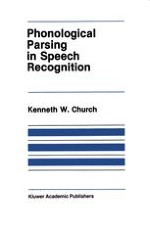1987 | OriginalPaper | Chapter
When Phonotactic Constraints are Not Enough
Author : Kenneth W. Church
Published in: Phonological Parsing in Speech Recognition
Publisher: Springer US
Included in: Professional Book Archive
Activate our intelligent search to find suitable subject content or patents.
Select sections of text to find matching patents with Artificial Intelligence. powered by
Select sections of text to find additional relevant content using AI-assisted search. powered by
Phonotactic constraints are not sufficiently strong to produce a unique syllabification in all cases. For example, in words like western, winter, water, veto, divinity, and so forth, phonotactic constraints do not tell us which way the /t/ will attach. Most theories of syllable structure invoke “tie-breaking principles” for words such as these. Two very common “tie-breaking principles” are The Maximize Onset Principle and Stress Resyllabification. By the first principle, there is a preference toward assigning consonants to the onset of the following syllable rather than than the coda of the previous syllable. Thus, for example, the /t/ in retire will be assigned to the onset of the second syllable (i.e., rě-tire) and not to the coda of the first syllable (i.e., *rět-ire). By the second principle, there is a preference toward assigning consonants to a stressed syllable over an unstressed one. Thus, for example, the /k/ in record will be assigned to the first syllable when it is stressed (i.e., réc-órd), and to the second syllable when it is stressed (i.e., rě-córd).
